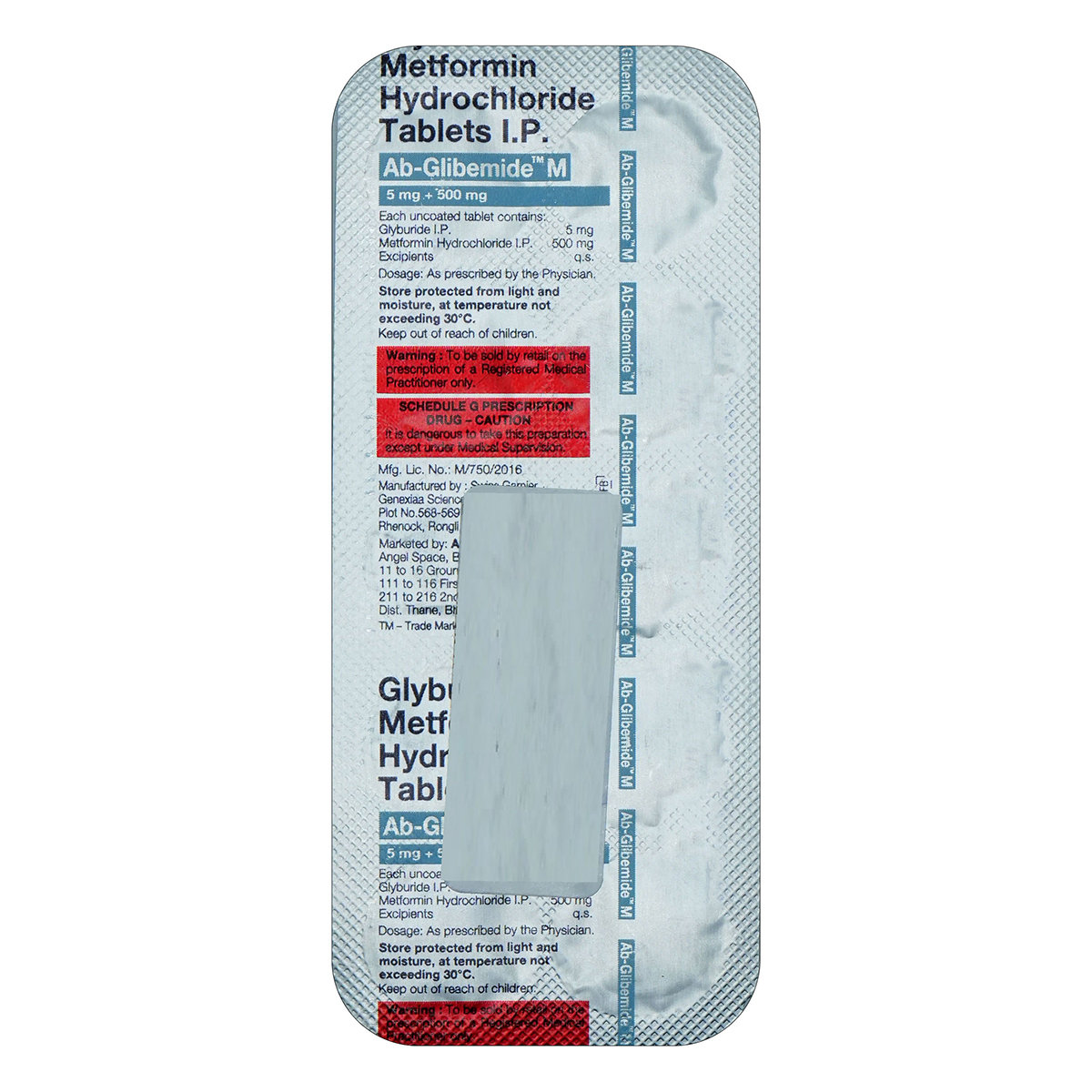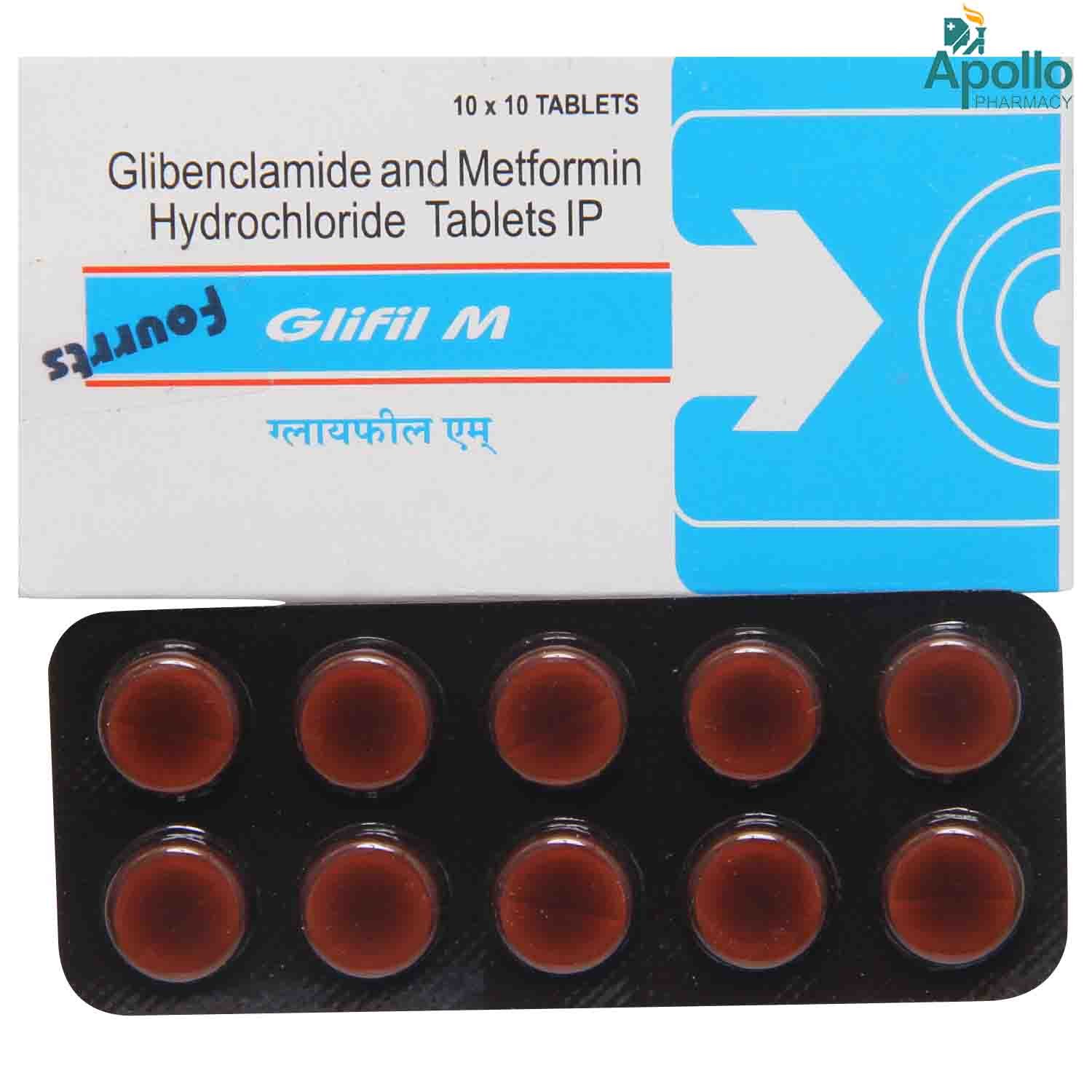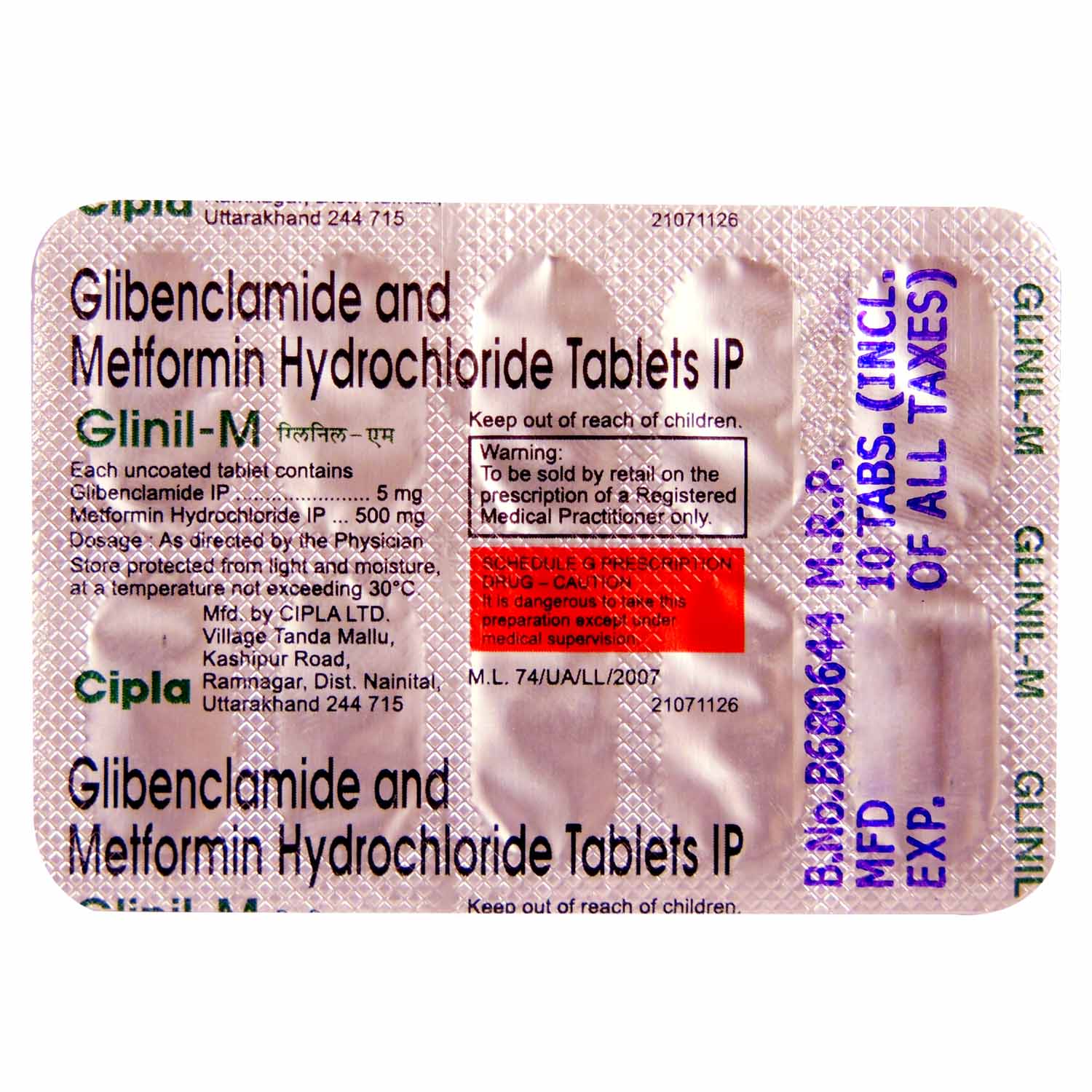Glibenclamide+metformin
About Glibenclamide+metformin
Glibenclamide+metformin belongs to the group of medications called ‘antidiabetic agents’ used in treating Type 2 diabetes mellitus. Type 2 diabetes is a chronic (long-lasting) condition that affects the way our body processes glucose. People with type 2 diabetes either do not produce enough insulin, or the insulin produced cannot perform its function in the body (insulin resistance).
Glibenclamide+metformin contains Metformin and Glibenclamide. Metformin works by reducing the sugar production by cells in the liver and delays sugar absorption from the intestines. Glibenclamide works by stimulating beta cells in the pancreas that produce insulin. Thus, insulin helps to remove sugar from the blood.
Take Glibenclamide+metformin as prescribed by your doctor. You are advised to take Glibenclamide+metformin for as long as your doctor has prescribed it based on your medical condition. Sometimes, you may experience stomach pain, nausea, diarrhoea, vomiting, headache or low blood sugar. Most of these side effects of Glibenclamide+metformin do not require medical attention and gradually resolve over time. However, if the side effects persist or worsen, please consult your doctor.
Do not consume if you are allergic to any components in the Glibenclamide+metformin. Glibenclamide+metformin is not recommended for children. If you are pregnant or planning for pregnancy, please inform your doctor before taking Glibenclamide+metformin. Glibenclamide+metformin should be used with caution in elderly patients. Avoid alcohol consumption with Glibenclamide+metformin as it may increase the risk of lactic acidosis (accumulation of lactic acid in the body). Drive only if you are alert after taking Glibenclamide+metformin.
Uses of Glibenclamide+metformin
Medicinal Benefits
Glibenclamide+metformin contains Metformin and Glibenclamide. Metformin works by reducing the sugar production by cells in the liver and delays sugar absorption from the intestines. Glibenclamide works by stimulating beta cells in the pancreas that produce insulin. Thus, insulin helps to remove sugar from the blood. Together Glibenclamide+metformin decreases the elevated blood sugar level after the meal along with the recommended diet and exercise.
Directions for Use
Storage
Side Effects of Glibenclamide+metformin
- Nausea (feeling sick)
- Vomiting (falling sick)
- Diarrhoea
- Stomach ache
- Loss of appetite
Drug Warnings
Do not take Glibenclamide+metformin if you are allergic to metformin, glibenclamide or other contents. Glibenclamide+metformin may cause ‘lactic acidosis’ (buildup of lactic acid in the blood), characterized by abdominal pain, muscle cramps, vomiting, severe fatigue, and difficulty breathing. It is a life-threatening condition that requires immediate medical attention. Inform your doctor if you have any severe liver or kidney problems, as their normal functioning is required to eliminate excess lactic acid from the body. Do not consume excess alcohol, as it increases the risk of lactic acidosis. Inform your doctor if you have any hormonal problems, infectious diseases, or glucose-6-phosphate dehydrogenase - G6PD deficiency (an inherited condition that causes the breakdown of red blood cells).
Drug Interactions
Drug-Drug interactions: Glibenclamide+metformin may interact with antifungal drug (miconazole) or iodine contrast agents (used for X-ray or scan) while using Glibenclamide+metformin. Glibenclamide+metformin may interact with medications used to treat high blood pressure like (ritodrine, salbutamol, terbutaline, and bosentan), bile acid sequestrants (lower cholesterol levels), drugs used to treat skin inflammation such as corticosteroids, a drug used for diagnosis of adrenocortical insufficiency (tetracosactide), pain killer (phenylbutazone), antifungal drug (fluconazole), a medication used to treat mental illness (chlorpromazine), a medication used to reduce urine production (desmopressin), and medication used to treat endometriosis (danazol).
Drug-Food interactions: No interactions found.
Drug-Disease interactions: Glibenclamide+metformin should be used with caution in patients with liver, kidney, hormonal, infectious, and heart problems.
Drug-Drug Interactions Checker List:
Safety Advice

Alcohol
cautionAlcohol may increase the risk of side-effects.

Pregnancy
cautionGlibenclamide+metformin should be used with caution only if prescribed by a doctor in pregnant women as it may cause toxic effects to the fetus.

Breast Feeding
cautionBreastfeeding mothers should not take Glibenclamide+metformin unless prescribed by your doctor.

Driving
cautionGlibenclamide+metformin may cause vision problems. So, it is not recommended to drive if your vision is blurred while using Glibenclamide+metformin.

Liver
cautionGlibenclamide+metformin should be used with caution in patients with liver diseases. Dose adjustments may be necessary.

Kidney
cautionGlibenclamide+metformin should be used with caution in patients with severe kidney impairment. Consult your doctor for further advice.

Children
unsafeGlibenclamide+metformin is not recommended for use in children below 12 years of age.
Habit Forming
Diet & Lifestyle Advise
- Prefer eating a meal that contains plenty of vegetables, fruits and whole grains. Opt for non-fat dairy products and lean meats.
- Eat at regular intervals. Do not take a long gap between a meal or snack.
- Monitor your blood glucose levels regularly as advised by your doctor.
- Keep a check on your weight. Shed excess weight by exercising regularly.
- Do not take stress as it shows the effect on blood sugar levels.
- Quit smoking and limit alcohol intake.
Special Advise
- Glibenclamide+metformin shows optimum effects when you follow healthy lifestyle changes like weight loss, regular exercise, healthy diet, etc.
Patients Concern
Disease/Condition Glossary
Type 2 diabetes mellitus: Type 2 diabetes mellitus is a chronic condition in which blood glucose levels are elevated in the body. Insulin is responsible for the utilization of glucose by the cells. In type 2 diabetes, the body cells do not respond to insulin or in later stages, your body may not produce enough insulin. Symptoms include excessive thirst, excessive hunger, fatigue, increased appetite and dry mouth. If not properly treated, this condition may worsen over time and cause toxic effects.
FAQs
Glibenclamide+metformin is only prescribed for the treatment of type 2 diabetes mellitus and is not recommended to treat type 1 diabetes.
You may experience increased thirst and hunger, frequent urination, weight loss, slow-healing wounds and frequent infections if you have diabetes. Consult a doctor to confirm the diagnosis.
Glibenclamide+metformin reduces elevated blood glucose levels. It works by increasing glucose utilization and insulin production in the body.
Glibenclamide+metformin tablets are preferably taken with a meal to reduce side-effects. It is swallowed with a whole glass of water, do not chew or crush it. Take this medication regularly as prescribed by your doctor.
Glibenclamide+metformin should be taken even if your blood sugar levels are in control. Your doctor may lower the dose or ask you to stop the medication depending on your health condition.
Type 2 diabetes mellitus is a lifelong condition in which blood glucose levels are elevated in the body. It occurs when the insulin is not produced enough or the body cells do not respond as normal to the produced insulin. Insulin is a hormone essential for glucose utilization in the body.
Yes, long term use of metformin in Glibenclamide+metformin may cause difficulty in absorption or vit B12, deficiency of vit B12 may cause anemia and nerve problems.






